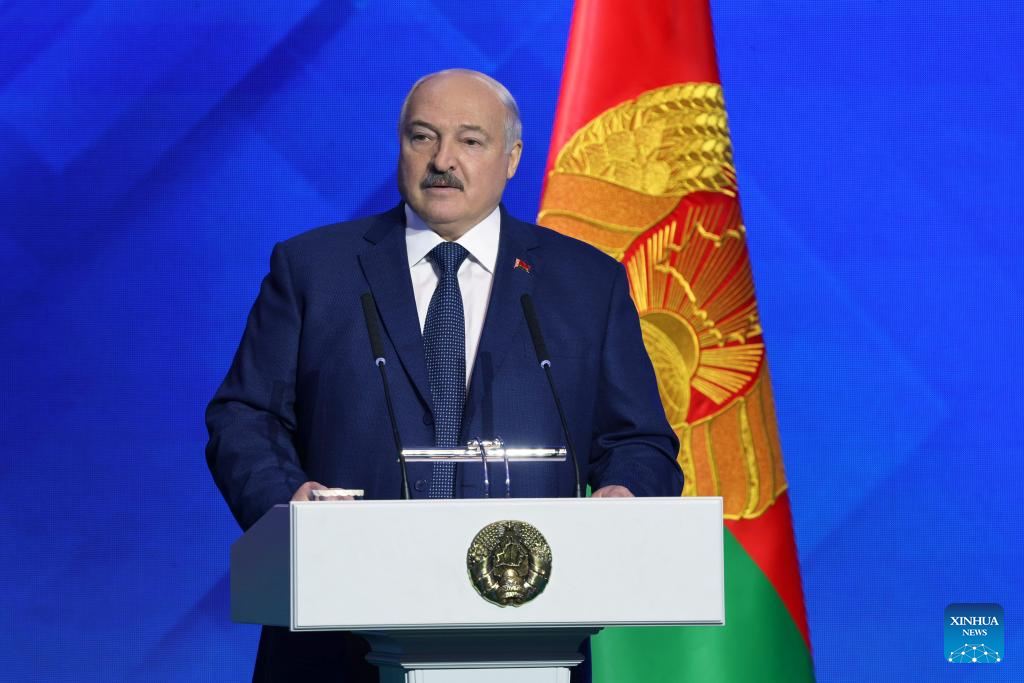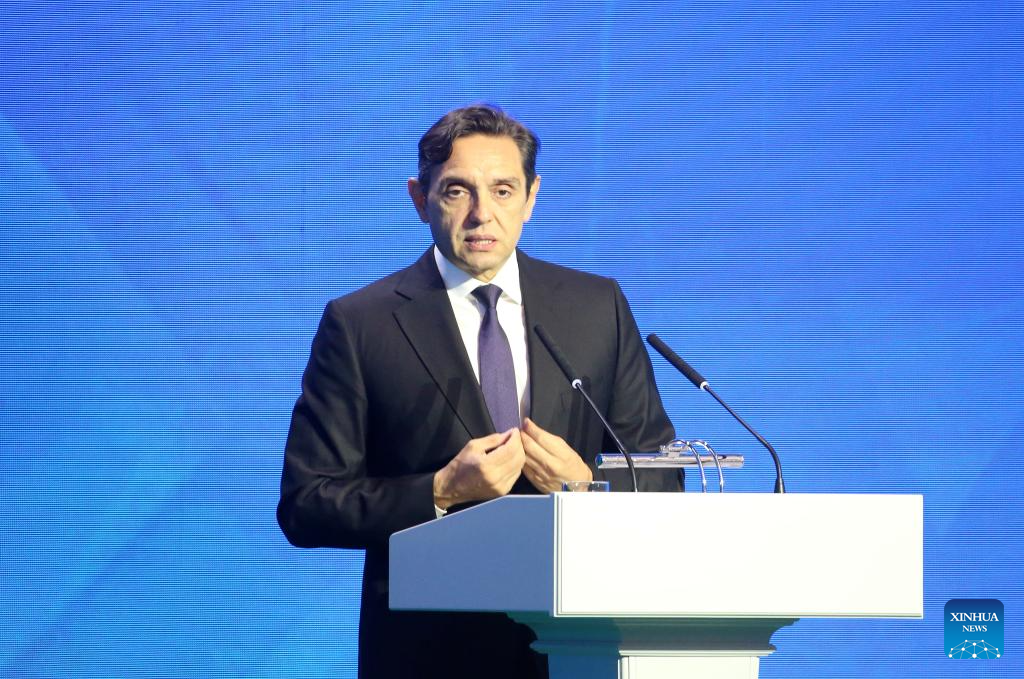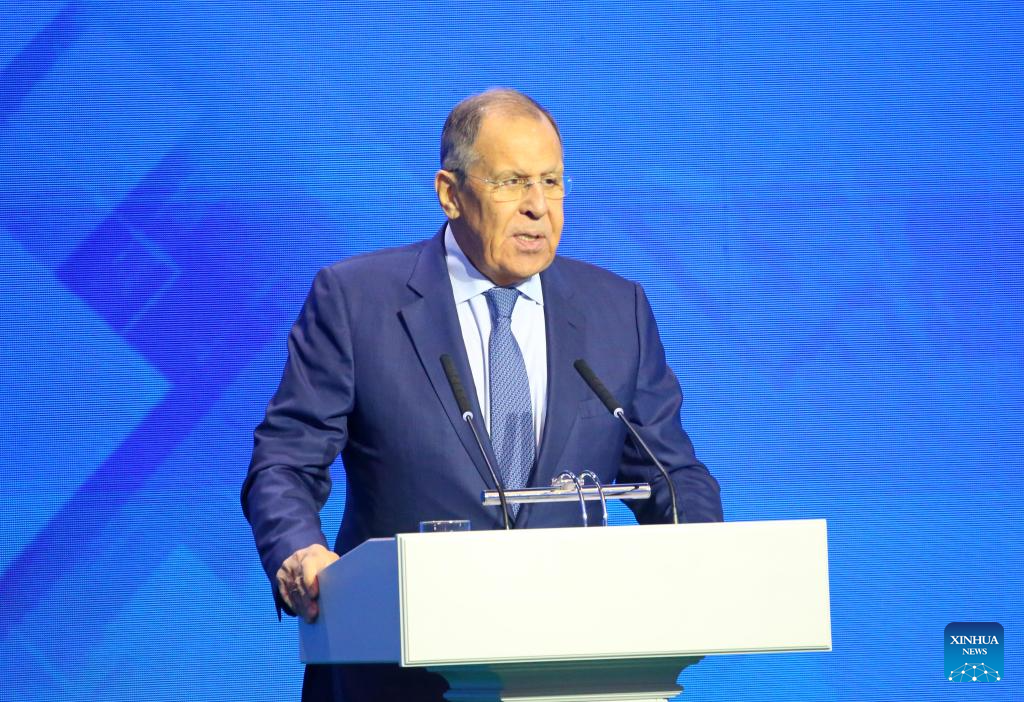
Belarusian President Alexander Lukashenko delivers a speech during the Second Minsk International Conference on Eurasian Security in Minsk, Belarus, Oct. 31, 2024. The Second Minsk International Conference on Eurasian Security kicked off on Thursday, with the aim to conduct frank and inclusive discussions on such topics as the multi-polarization of the world, security on the Eurasian continent, and global economic security. (Press Service of the President of the Republic of Belarus/Handout via Xinhua)
MINSK, Oct. 31 (Xinhua) -- The Second Minsk International Conference on Eurasian Security kicked off on Thursday, with the aim to conduct frank and inclusive discussions on such topics as the multi-polarization of the world, security on the Eurasian continent, and global economic security.
At the opening ceremony, Belarusian President Alexander Lukashenko said that security crises have swept across the globe and countries are increasingly compelled to use military force to protect their sovereignty and prevent the escalation of tensions, adding that further deterioration of the conflicts in Ukraine and the Middle East will have irreversible consequences globally.
Lukashenko highlighted an urgent need for the world to have a frank dialogue and a fair assessment of the current events in order to safeguard the comprehensive security of all countries in the military, political, economic, informational and other spheres.
The president also said that security initiatives put forward by leaders of a number of Eurasian countries, as well as China's Global Security Initiative (GSI) and the concept of building a community with a shared future for mankind are crucial to solving current problems and establishing a working mechanism for ensuring global security.
Serbian Deputy Prime Minister Aleksandar Vulin stressed that the biggest problem in the world today is the lack of international law while some Western leaders are committed to destroying rather than building it.
"When talking about Eurasian security, it is important to consider not only the countries and governments that are geographically located on a certain continent but also the people who share the same values as those countries," Vulin said, adding that as far as security is concerned, the world must show the courage and sense of responsibility to reach a new consensus if human civilization is to have a way out.
Russian Foreign Minister Sergei Lavrov said the main trend in today's world is the formation of a multipolar world order, an irreversible natural process linked to objective changes in the world balance, economic growth and the strengthening of the influence of new, non-Western centers.
This trend promotes the democratization of international relations, in which there should be no hegemony of anyone and where the principles of the UN Charter should be observed in a comprehensive and not selective manner, Lavrov noted, adding that Russia's vision of Eurasian security corresponds to the GSI.
The two-day conference, organized by the Belarusian Foreign Ministry, draws nearly 600 officials and experts from more than 40 countries and regions. ■

Serbian Deputy Prime Minister Aleksandar Vulin delivers a speech during the Second Minsk International Conference on Eurasian Security in Minsk, Belarus, Oct. 31, 2024. The Second Minsk International Conference on Eurasian Security kicked off on Thursday, with the aim to conduct frank and inclusive discussions on such topics as the multi-polarization of the world, security on the Eurasian continent, and global economic security. (Photo by Henadz Zhinkov/Xinhua)

Russian Foreign Minister Sergei Lavrov delivers a speech during the Second Minsk International Conference on Eurasian Security in Minsk, Belarus, Oct. 31, 2024. The Second Minsk International Conference on Eurasian Security kicked off on Thursday, with the aim to conduct frank and inclusive discussions on such topics as the multi-polarization of the world, security on the Eurasian continent, and global economic security. (Photo by Henadz Zhinkov/Xinhua)
